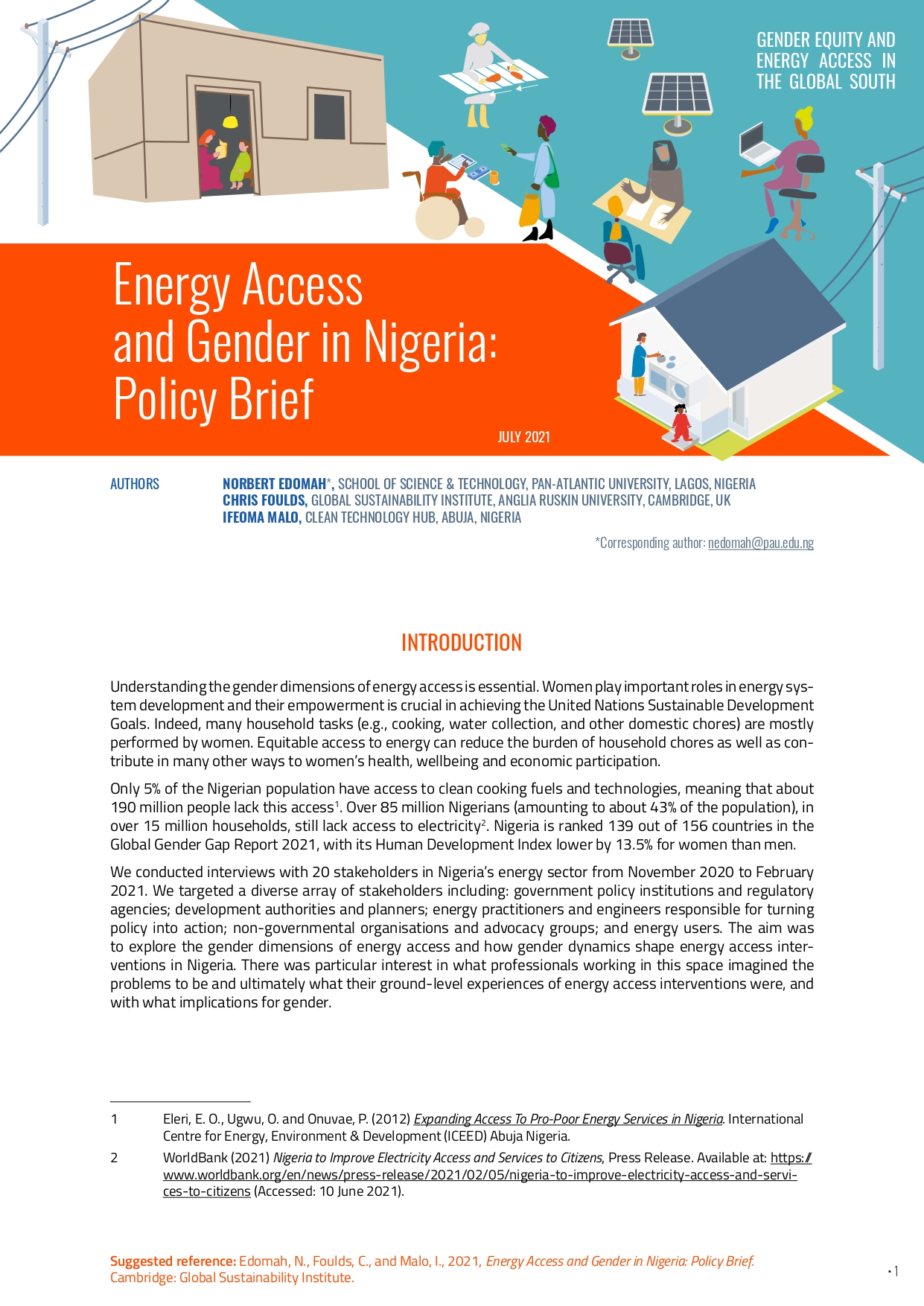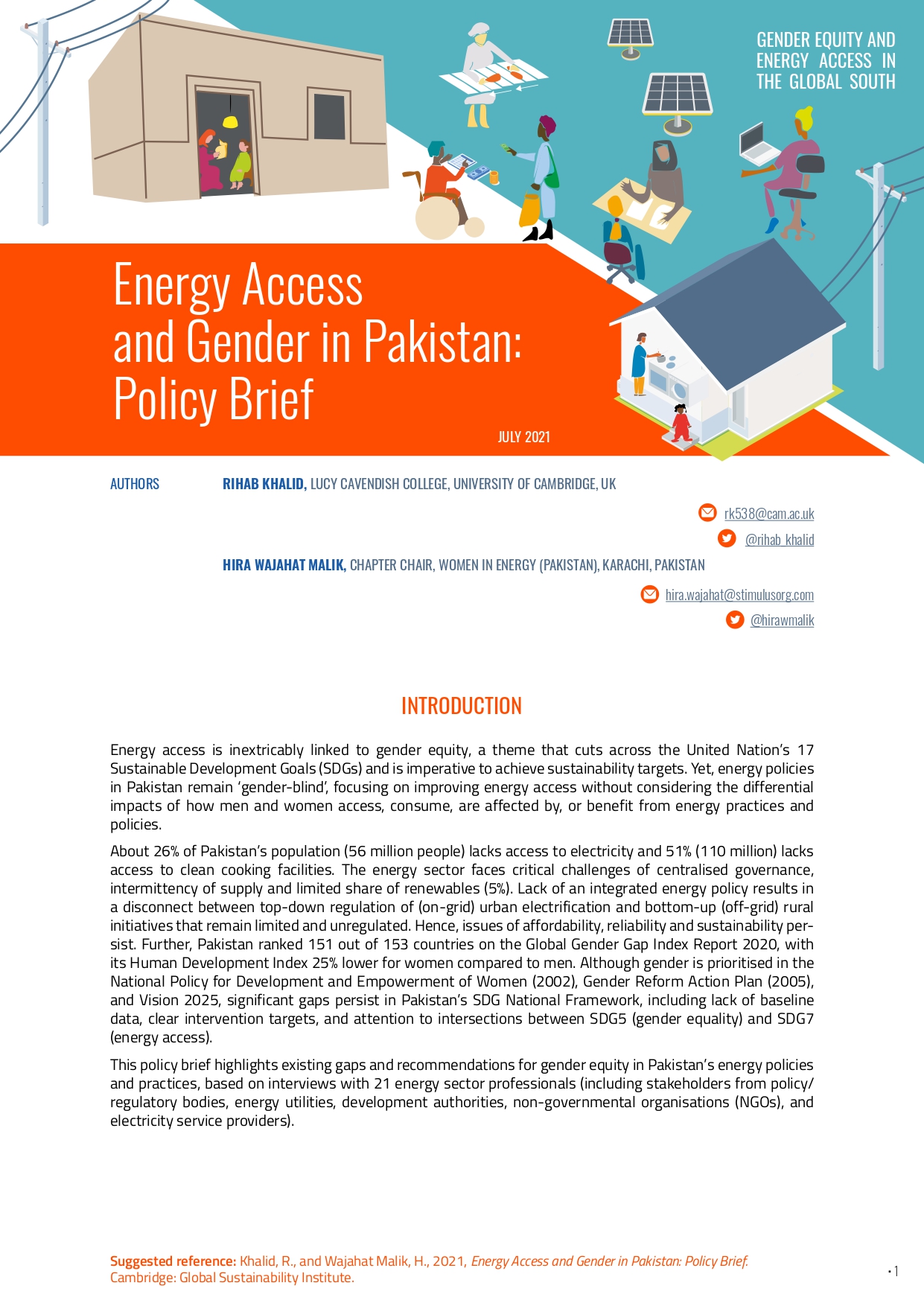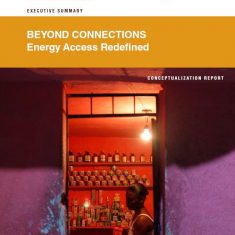publication-type: Policy brief/Country brief
-
Energy Access and Gender in India: Policy Brief
The connection between equity in energy access and developmental aspects like poverty reduction, health and wellbeing is today well understood. Responding to this, energy access policies and programmes in India have tried to address gender equity within energy access, but much of this effort has failed to create a transformational impact. Until 2018, 680 million…
-

Energy Access and Gender in Nigeria: Policy Brief
Understanding the gender dimensions of energy access is essential. Women play important roles in energy system development and their empowerment is crucial in achieving the United Nations Sustainable Development Goals. Indeed, many household tasks (e.g., cooking, water collection, and other domestic chores) are mostly performed by women. Equitable access to energy can reduce the burden…
-

Energy Access and Gender in Pakistan: Policy Brief
Energy access is inextricably linked to gender equity, a theme that cuts across the United Nation’s 17 Sustainable Development Goals (SDGs) and is imperative to achieve sustainability targets. Yet, energy policies in Pakistan remain ‘gender-blind’, focusing on improving energy access without considering the differential impacts of how men and women access, consume, are affected by,…
-
Gender and energy country brief – Kenya
Energy is a critical enabler in reaching development goals. However, the benefits of increased access to modern and cleaner energy services often fail to accrue evenly to men and women. The African Development Bank and ENERGIA recognise the need to prioritise policy action in the field of gender and energy to meet the inter-national Sustainable Development…
-
Gender and energy country briefs – Uganda
Energy is a critical enabler in reaching development goals. However, the benefits of increased access to modern and cleaner energy services often fail to accrue evenly to men and women. The African Development Bank and ENERGIA recognise the need to prioritise policy action in the field of gender and energy to meet the international Sustainable…
-
Gender and energy country briefs – Tanzania
Energy is a critical enabler in reaching development goals. However, the benefits of increased access to modern and cleaner energy services often fail to accrue evenly to men and women. The African Development Bank and ENERGIA recognise the need to prioritise policy action in the field of gender and energy to meet the international Sustainable…
-
Gender and energy country briefs – Rwanda
Energy is a critical enabler in reaching development goals. However, the benefits of increased access to modern and cleaner energy services often fail to accrue evenly to men and women. The African Development Bank and ENERGIA recognise the need to prioritise policy action in the field of gender and energy to meet the international Sustainable…
-
Policy Brief: The role of appliances in achieving gender equality and energy access for all
A holistic energy access approach, taking into account the role of appliances, is needed if we are to achieve access to energy for all (Sustainable Development Goal 7) and gender equality (Sustainable Development Goal 5) by 2030. Appliances can reduce drudgery and save time in performing household tasks. They can also be transformative from an…
-
Policy Brief: The benefits of involving women in energy system supply chains
Women’s involvement in energy supply chains has advantages for the acceleration of access to modern energy services, for the women involved and for their families. In energy supply roles in rural communities, women perform as well as men and in some cases even outperform them. Opening up the prospects of business and jobs in a…
-
Policy Brief: Why energy access and gender equality are inextricably linked
The Sustainable Development Goal 7 (SDG7)’s ambitious mandate to ensure access to modern energy for all will only be reached if gender is taken into account. ENERGIA’s Gender and Energy Research programme has found evidence on the differences between women and men in their energy needs, both in the household and in business, and in…
-

Beyond Connections: Energy Access Redefined
Access to energy is a key enabler of socioeconomic development. Energy is needed for multifarious applications across households, productive uses, and community infrastructure. “Universal access to modern energy by 2030” has been proposed as one of the three key pillars of the Sustainable Energy for All (SE4All) program, an initiative co-chaired by the United Nations…
-
Integrating Gender Considerations into Energy Operations
In the energy sector, the gender dimensions of access to services, access to benefits, and exposure to risks and benefits, are being increasingly recognized as important elements to be considered for effective policy making and project design. In practice, this translates into integrating a gender perspective throughout the operational cycle to improve gender equity in…

